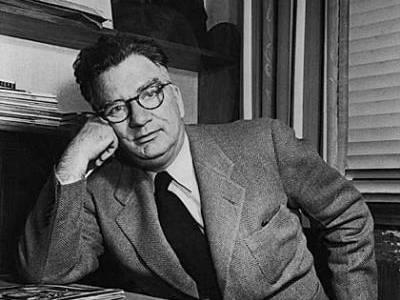About
James M. Cain

James Mallahan Cain (1892-1977) once described himself as an “ugly, Irish Catholic mama's boy”. Born in Maryland to upper-middle-class parents, his father was an English professor and his mother an opera singer. Although raised a Catholic, by the age of 13 he had abandoned the church and never returned. Cain’s relationship with his parents was often distant, something he later described as “one of the blights” of his life.
After graduating Washington College, Cain attempted a number of different jobs – including state road inspector and high school teacher – to little success or satisfaction. He also studied singing in the hopes of a career in opera, like his mother. But his voice was never good enough and eventually he made the big decision to try writing instead. He admitted that compared with a career in music, “writing to me was distinctly a consolation prize.” Cain’s musical appreciation and knowledge would inspire a number of his novels.
In 1917, Cain earned a master’s degree in drama from John Hopkins University and then began his journalism career, working for the Baltimore American and then The Baltimore Sun. In 1918 his career was put on hold when he enlisted to serve in the First World War. While in France, he edited his company’s weekly paper which became one of the most successful publications of the US forces.
After the war he returned to the US and his career in journalism. In 1920 he married Mary Rebekah Clough and, after a brief marriage, they separated in 1923. In 1922 Cain also made his first attempt at a novel, but his early novels were never published. He left the Baltimore Sun to teach English and journalism at St. John’s College, Annapolis, from 1923 to 1924 and then left there to write editorials for the New York World under Walter Lippman from 1924 to 1931. For a short time, he was also the managing editor of The New Yorker, during which time he established a reputation as a sharp-edged, witty, political commentator.
In 1927, after his first divorce was finalized, Cain married Elina Sjösted Tyszecka. A year later he published his first short story Pastorale about a grisly murder told in the first person with a blackly comic edge. This story established his favorite theme of two people committing a murder and struggling to live with the outcome of their crime. After the success of his first story, Cain began to focus his attention on writing fiction.
In 1931, several Hollywood producers invited Cain to Los Angeles to write screenplays, so he moved there to work first for Paramount, and later Columbia. Although he found himself unemployed six months later, California deeply resonated with Cain and he was unwilling to leave. Instead, he started freelance writing, producing short stories, articles and editorials. He also began writing novels.
The Postman Always Rings Twice was published in 1934. It was an immediate success, bringing Cain considerable fame and acclaim. But the novel, brimming with raw sexual energy and violence, also scandalized many readers and was even tried for obscenity in Boston. This did not discourage Cain from continuing to write similarly visceral, gritty material for the rest of his career. Over the next few decades Cain wrote extensively, with many of his novels originally being published in serial form, including Double Indemnity. Like Cain’s first novel, The Postman Always Rings Twice, Double Indemnity was an instant best-seller and was made into a classic noir film. During Cain’s lifetime, nine of his works of fiction were made into movies, including the 1946 Oscar-winning Mildred Pierce starring Joan Crawford.
In 1974, Cain was awarded the Grand Master Award by the Mystery Writers of America. Cain’s success and influence also extended well beyond the United States. His writing has been translated into nineteen languages and adaptations of his work have been made in French, Italian, Hungarian and German. In 1942 Cain divorced Tyszecka and married the actress Aileen Pringle two years later. Again, this marriage ended in divorce and in 1947 he married his fourth wife, Florence Macbeth Whitwell, an opera singer. Cain never had any children from any of his marriages. In 1947, for reasons unknown, Cain and Florence left Hollywood and returned to Maryland. Over the next 29 years he wrote a further nine novels, but only three were published. He died of a heart attack in 1977, at the age of 85.



